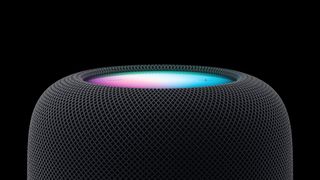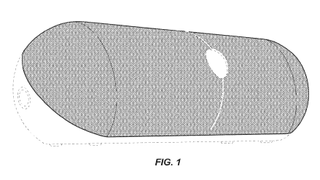The next HomePod could be more like a soundbar according to this Apple patent – and it hints at fixing the HomePod 2’s biggest issue
An unexpected design and an exciting new addition

The next Apple HomePod might have a much longer and thinner horizontal design than previous models, making it look more like a soundbar, according to an Apple patent spotted by AppleInsider.
The patent details the design of what appears to be a horizontal HomePod with speakers and a central display that reminds us of the design of the JBL Charge 5 speaker or a chunkier soundbar, like the Sonos Ray. Either way, it’s a huge departure from the cylindrical design of the first HomePod or the HomePod Mini’s cute sphere aesthetic.
It makes sense that Apple is looking to shake up the HomePod as its design hasn’t changed much in years. However, this latest patent is an interesting development considering we’ve seen several leaks suggesting a display-enhanced HomePod is on the way next. This would be bigger than the previous Apple HomePod 2 model and would replace the swirling waveform orb on top with a large screen.
This certainly doesn't seem to be that. In fact, this might better fit the rumors of a HomePod and Apple TV combination device.

Mystery ports and Siri upgrades
The patent is simply called "Audio Speaker System" and doesn’t give away much else apart from six drawings with basic text explaining that the images show it from different angles. However, one interesting thing that could be easy to overlook is that the rearview drawing of this new version of the HomePod appears to have a range of ports, which would be a first for an Apple HomePod.
The biggest issue with Apple’s HomePod 2 right now is that there’s no way to get sound into it from a source other than either Apple’s AirPlay (which streams from your Apple devices) or Siri. So if the next version of the Apple HomePod comes with standard connection ports, that will be a huge bonus, giving people a lot more choice and flexibility about how they listen to music. Alternatively, it could be a sign that this design would indeed be an Apple TV in function too – rather than audio-focused ports, they might be HDMI and Ethernet ports.
If they are for audio, the potential to not need Apple’s AirPlay or Siri is also a good idea considering Siri isn’t that great – or at least not compared to its rivals. In a recent news post about the rumored HomePod with a screen, we wrote: “an Apple HomePod with the current version of Siri at its core can't compete with the best smart speakers in the business in 2024”. Maybe Apple plans on moving its focus away from Siri’s capabilities and more to a fantastic home speaker system? That might be the best bet, at least until Siri can match up to other smart assistants because right now it’s lagging behind.
Get the best Black Friday deals direct to your inbox, plus news, reviews, and more.
Sign up to be the first to know about unmissable Black Friday deals on top tech, plus get all your favorite TechRadar content.
Then again, maybe Apple is already working behind the scenes to address these problems. After all, we’ve been saying that Siri is being left behind – and Apple knows it for more than a year. That would certainly make sense considering recent news that Apple researchers have revealed an AI breakthrough that could make Siri much smarter.
In the new paper, Apple researchers say the AI assistant may soon understand the context of your requests better than ever because it’ll consider what you’re asking and what’s currently on your screen, like what music you’re playing, for example. Knowing these details may seem small but would be significant in making better recommendations.
You might also like...
Becca is a contributor to TechRadar, a freelance journalist and author. She’s been writing about consumer tech and popular science for more than ten years, covering all kinds of topics, including why robots have eyes and whether we’ll experience the overview effect one day. She’s particularly interested in VR/AR, wearables, digital health, space tech and chatting to experts and academics about the future. She’s contributed to TechRadar, T3, Wired, New Scientist, The Guardian, Inverse and many more. Her first book, Screen Time, came out in January 2021 with Bonnier Books. She loves science-fiction, brutalist architecture, and spending too much time floating through space in virtual reality.
Most Popular


